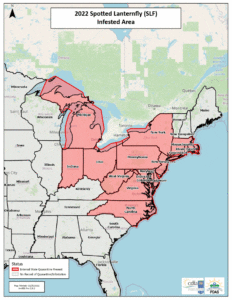Michigan reminds shippers about spotted lanternflies
 California has begun enforcing its spotted lanternfly (SLF) quarantine. The Golden State considers any state with spotted lanternfly detections to be “infested” and subject to regulation, according to a MDARD news release. Plants or plant parts and a variety of other articles, including conveyances (trucks, rail cars, planes, etc.) cannot be shipped into California without assurance of being free from SLF, according to the release.
California has begun enforcing its spotted lanternfly (SLF) quarantine. The Golden State considers any state with spotted lanternfly detections to be “infested” and subject to regulation, according to a MDARD news release. Plants or plant parts and a variety of other articles, including conveyances (trucks, rail cars, planes, etc.) cannot be shipped into California without assurance of being free from SLF, according to the release.
“If you are shipping plants or plant parts into California, you may be required to have a certificate of SLF quarantine compliance before your products will be accepted,” MDARD officials said in the release. “The MDARD stands ready to help you.”
The SLF is a destructive invasive species that has negatively impacted agriculture operations. It feeds on more than 70 plants, including apples, grapes, hops and hardwood trees. The insects cause direct damage by sucking sap from host plants and secreting large amounts of a sugar-rich, sticky liquid called honeydew. The honeydew and the resulting black sooty mold can kill plants and foul surfaces. The honeydew attracts other pests including yellow jackets, flies and ants, harming crop harvesting.
For guidance, shippers are urged to contact their MDARD inspector or call the customer service center at 800-292-3939. Michigan staff plans to assist shippers in getting their products safely delivered to its California destination and meeting the state’s regulatory requirements, according to the release.
The current CDFA quarantine map can be viewed here and read information about the California SLF quarantine here.
SLF was first detected in North America in 2014 in Pennsylvania and since spread to 14 eastern states. In Michigan, it was discovered in Oakland County, on the northwest side of the Detroit metropolitan area, in August. For information on Michigan’s spotted lanternfly detections, please visit www.michigan.gov/spottedlanternfly.
SLF feeds on a wide range of fruit, ornamental and woody trees, with tree-of-heaven being one of the pest’s preferred hosts. SLFs are invasive and can be spread long distances by people who move infested material or items containing egg masses. If allowed to spread, the pest could jeopardize the grape, orchard and logging industries.
TOP PHOTO: Michigan authorities are reminding shippers that transport plants or plant parts to California to be aware California may require a certificate of spotted lanternfly quarantine compliance. Photo: University of Pennsylvania










